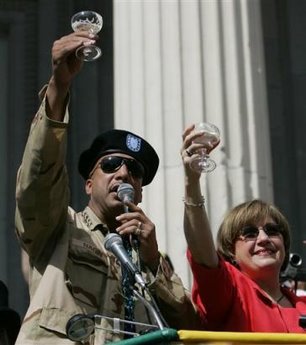Sunday, March 05, 2006
"Broad dissatisfaction with the status quo"

Ballot jammed for N.O. primary
Political landscape, redrawn by storm, lures 116 candidates
TIMES PICAYUNE
By Frank Donze and Gordon Russell
Staff writers
(excerpt)
Broad dissatisfaction with the status quo in a city reeling from the destruction wrought by Hurricane Katrina, along with a shift in New Orleans' demographics, have conspired to offer voters in the April 22 primary election the most crowded ballot for local offices in the city's modern history.
If Katrina had not caused the elections to be postponed, runoff voting would have taken place today, and the city would have known its new mayor and other elected officials by tonight. Instead, the runoff won't be until May 20.
By the time qualifying ended Friday, 116 candidates had signed up for 20 offices, leaving no sitting official without opposition, even those who have held their offices largely unchallenged for decades. And as expected, a group of seven candidates who want to consolidate the assessor offices into one signed up to face off with all seven incumbents.
A whopping 23 candidates plan to challenge incumbent Ray Nagin in the race for mayor, though one contender already says he plans to drop out.
The primary election is only seven weeks from today.
Apart from the wide-open mayoral race, the hottest ticket on the ballot -- at least judged by the number of candidates -- is for the suddenly vacant job of criminal court clerk. Initially 15 candidates qualified, but two later dropped out, including incumbent Butler.
The field of late qualifiers for criminal clerk includes some politically intriguing names, among them Jamila Jefferson, daughter of embattled U.S. Rep. Bill Jefferson, who is the target of an ongoing federal probe; former Criminal Court Judge Morris Reed, a longtime Jefferson ally who has unsuccessfully sought other public office on numerous occasions; and Juana Lombard, who is married to a cousin of 4th Circuit Court of Appeal Judge Ed Lombard, who for three decades was the criminal clerk. Also in the race is longtime state Rep. Arthur Morrell, who is barred by term limits from seeking re-election next year.
The massive field of candidates no doubt owes in part to the city's shifting demographics. Before Katrina, black voters made up about two-thirds of the electorate, making it exceedingly difficult for white candidates to be elected to citywide offices in particular. Now, black and white residents are thought to be in relative parity, though pollsters concede they don't know what the true makeup of the voting public will be.
Along with the long list of names, the ballot contains a few other oddities that can be chalked up to the chaos of the post-Katrina world. Eight candidates list addresses outside the city, something that would have been unthinkable pre-Katrina but which is legal now provided the candidate is still registered to vote in Orleans Parish.
While most of those with non-New Orleans addresses live in the surrounding area, not all of them do. In what is surely a first in city politics, Roderick Dean, a longshot candidate for mayor, lists an address in Louisville, Ky., and Errol George, a member of the "IQ ticket," put down an address in Stockbridge, Ga.